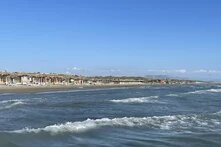On 15 December, Chancellor Scholz will attend the Eastern Partnership summit, where high-level representatives of the EU, the EU member states and the Eastern Partnership (EaP) states will give their political endorsement for the post-2020 EaP agenda. There are vast differences between states represented at the summit – in terms of both their prospects for democratisation and genuine will to cooperate – and there have been no shortage of political crises in the EU’s neighbourhood of late, but despite all this, the summit threatens to project an image of ceremony without substance. How can the new government rouse German policy towards the EaP from its long hibernation and contribute to a more effective partnership?

Formal approval of the “Renewed Agenda for Recovery, Resilience and Reform Underpinned by an Economic and Investment Plan” for the EaP beyond 2020 tops the agenda for this sixth summit of the EaP. Made up of the European Union, Armenia, Azerbaijan, Belarus, Georgia, the Republic of Moldova and Ukraine, the Eastern Partnership was launched in 2009 to add a specific eastern dimension into the European Neighbourhood Policy. From the EU’s perspective, the idea was to bring its Eastern neighbours closer, politically and economically, to the EU by creating a framework for close cooperation that was not linked to a prospect for membership. The groundwork for this has been laid in the past years with the entry into force of association agreements and Deep and Comprehensive Free Trade Area Agreements (DCFTA) with Moldova, Georgia and Ukraine, as well as the Comprehensive and Enhanced Partnership Agreement with Armenia (CEPA), and first successes are already apparent. Visa liberalisation with Moldova, Georgia and Ukraine also figures on the list of EaP achievements. The partnership has been less successful when it comes to supporting democratic reform though. What factors are at play in the complex political background to the sixth EaP summit? What kind of attitude, and what fresh new ideas should the new Federal Government bring to its EaP engagement?
Troubled waters
The endless political turbulence that has rocked the EaP countries in recent years has not left the EaP untouched. The democracy movement in Belarus made it clear that universal human rights and the European Union’s values have lost none their appeal, though Lukashenko, using brutal tactics, succeeded at keeping his grip on the helm. Post-revolution Armenia was severely shaken by the second Nagorno-Karabakh war and its loss of territories to Azerbaijan, accompanied by a loss of trust in the EU in the face of Brussel’s obvious inability to react. Georgia has been in caught up in an unceasing domestic political crisis for the past two and a half years; genuine democratic reforms there are all on ice, and recent forays into anti-western rhetoric by the governing party have strained the country’s relations with the EU. Ukraine has been struggling to make progress in the area of good governance, with moderate success, and now faces a particularly grave threat from Russia, while the EU appears to have little to say about any of this. Only Moldova can point a series of unambiguously positive developments – the political success of Maia Sandu and the Party of Action and Solidarity that she founded have made some major progress in the fight against corruption and with some other reforms as well.
On the EU side, too, there have been some far-reaching changes that are of relevance for the EaP. Brexit appears to have endangered the Union’s stability. Increasingly illiberal trends in a number of EU member states jeopardise the credibility of the EU’s democracy-building efforts. The Covid-19 pandemic has been wreaking havoc with – and dominating – political agendas everywhere, even as the EU has been setting up an extensive new framework for internal and external policy, the European Green Deal.
A new approach and its shortcomings
While all of this was going on, the European Commission and High Representative of the Union for Foreign Affairs and Security Policy defined their approach to the EaP beyond 2020. Strengthening resilience, or “the ability of states and societies to reform, thus withstanding and recovering from internal and external crises”, is the overall goal of the new policy, which focuses on the economic sphere, good governance and security, climate and the environment, the digital transformation and society. An economic and investment plan worth as much as 2.3 billion of EU budget money and with a potential to mobilise up to 17 billion euros in public and private investments, will underpin the EaP cooperation going forward.
While its general reception was largely positive, the agenda met with some clear criticism as well. Firstly, one criticism is that only one of the 10 concrete targets proposed actually aims at good governance in the narrower meaning of the term – despite the major challenges in this area. Although “shared fundamental values” are still considered a pillar of the EaP and despite the fact that democracy and security are viewed as equally fundamental elements of resilience, progress on democratisation is apparently not going play a central role in concrete cooperation within the post-2020 Eastern Partnership. The EaP Civil Society Forum is one of several organisations that criticised the fact that the EU’s economic support is not contingent on progress in the area of good governance. Secondly, the fact that EU did not acquiesce to the request of Georgia, Ukraine and the Republic of Moldova for a “two-speed EaP” has also come under criticism. An unwillingness to leave Armenia behind has been mentioned as one reason for this. Visibly disappointed, the three EaP states formally established the “Association Trio” for the purpose of working together to pursue their shared interest in greater integration in EU structures. Thirdly, there is widespread uncertainty about how, and how well, the European Green Deal is going mesh with the Eastern Partnership. While the topic of climate and the environment is identified as a focus for the new EaP agenda, a comparison of the relevant proposals for the post-2020 EaP to the measures outlined in the Action Plan on the Green Agenda for the Western Balkans makes it obvious that the EaP provisions are far less extensive, in terms of both substance and funding. This has raised question about future cooperation, particularly in the Trio states, and could give rise to enormous economic challenges for EaP countries, especially Ukraine.
Out of the prompter’s box and onto the political stage
It may well be that the substantial public criticism of the EU’s lack of action in the second Nagorno-Karabakh caused the EU to step up its engagement in the region. The EU has certainly played a more active role in Georgia’s internal politics this year than ever before, brokering a deal between the governing party and the opposition there, for instance. It also held back the loan of 75 million euros’ worth of micro-financial assistance on the grounds that Georgia had not made enough progress on reforms (though the Georgian government’s version gives the impression that it just did not need the money). The EU has also become more actively involved in the Karabakh conflict, for instance, mobilising over 17 million euros’ worth of humanitarian aid to help civilians affected by the war. In November, European Council President Charles Michel mediated between the Armenian and Azerbaijani leaders, Prime Minister Nikol Pashinyan and President Ilham Aliyev, respectively, and got them to agree to establish a direct line of communication between the two states’ defence ministers as well as to attend a bilateral meeting level in the margins of the EaP Summit. The EU also showed an admirable attitude towards Belarus: having withdrawn from the EaP in June 2021, Minsk will be represented by an empty chair at the EaP summit; high-level representatives of the EU met with the opposition leader Sviatlana Tsikhanouskaya several times in the run-up to the summit.
Moreover, the EU appears to have acquired a better understanding of how it might use the Association Trio to further its own interests. Council President Charles Michel attended the Trio’s summit in Batumi in July and proposed that the three EaP states start competitive benchmarking on reforms. In early December, the European Council adopted assistance measures to strengthen the medical and civil-defence capacities of the military forces of Georgia (EUR 12.75 million), Ukraine (EUR 31 million) and the Republic of Moldova (EUR 7 million) within the framework of the European Peace Facility. The prime ministers of the Association Trio countries also met with the presidents of the European Council, Commission and Parliament in Brussels ahead of the summit for the first time.
Germany’s new coalition government as an Eastern Partnership opportunity
Germany has not shown much in the way of ambition for the Eastern Partnership thus far. Even in the early years, Germany was seen to be taking a passive attitude towards it, and Germany is still seen in the Trio countries today more as an obstacle to the EaP than as a visionary promoter of it, in part due to its inconsistent and relatively non-confrontational policy towards Russia. The Eastern Partnership played only a minor role in the agenda of the German EU Council Presidency in 2020. Germany’s role may finally be about to change though, with advent of the “traffic-light coalition” (so-called because of the colours – red, green and yellow – of the three parties that form it, the Social Democrats, the Greens, and the Free Democrats) and the appointment of the Green Party’s Annalena Baerbock as foreign minister. In their Manifesto for the 2021 Parliamentary Elections, the Green Party declared its intent to promote democratic and socio-ecological transformation processes in the region, including through the use of stronger conditionality, to keep the way clear for the Trio countries to join the EU and to take over greater responsibility for the EU’s Eastern neighbours, with respect to both foreign and security policy. The coalition agreement, too, suggests a greater willingness for political engagement in Eastern Europe. How could the traffic-light coalition rouse German policy towards the EaP from its long hibernation and contribute to a more effective partnership?
- Greater political engagement by Germany within the EaP and the region
The new Federal Government should bring its political and economic clout to bear on the Eastern Partnership to greater effect. Achieving long-term stability in the region is going to take political commitment at a higher level, clearer language and ambitious aims. The coalition will also have to ensure greater coherency in German policy towards Eastern Europe in order to boost the credibility of German and European engagement. In concrete terms, Annalena Baerbock, as foreign minister could ensure that whoever is fills the post of coordinator for cooperation with the countries of the Eastern Partnership is not responsible only for cooperation with civil society, as past coordinators have been. Instead, the new coordinator should be charged with making Germany a strategic political player in the region, one that engages in active dialogue with civil society organisations and takes their concerns into account – and one that places greater priority on democracy and on dealing with conflicts in the region of our Eastern neighbours.
Germany’s relations with EaP countries should be dovetailed well with the EaP, but they should not be confined to it. The planned review of the development ministry’s 2030 reform package and the country list for bilateral development cooperation affords another opportunity to step up Germany’s engagement. Not selecting Armenia, an EaP country, as one of the transformation partners, despite its Velvet Revolution, was a mistake, both from the standpoint of democracy and in geopolitical terms. One that should be rectified as soon as possible. With Armenia on its list of bilateral development partners, the Federal Government could do more to promote Armenia’s democratisation and expand ties between the EU and the country, which is so strongly dependent on Russia, thus creating synergy effects for the Eastern Partnership.
The Nagorno Karabakh conflict is another topic on which the Federal Government should engage within the framework of EU. The meeting between Aliyev and Pashinyan in Brussels could serve as a cornerstone on which to base future EU engagement. The EU should pursue a practical agenda, make its financial support conditional on broader political progress, which might include, for instance, regular political dialogue, with EU involvement, between the parties involved in the conflict, improved access to the conflict zone for international agencies and organisations or even a new, inclusive and comprehensive peace process. It would be necessary to consult with Russia about this, as Moscow unquestionably has the strongest influence on both Armenia and Azerbaijan.
- Democracy and good governance into the focus of the Eastern Partnership
The difficulty of measuring progress in the area of democracy and good governance on the basis of quantitative indicators and of translating those aims into concise, easily communicated targets cannot be permitted to cause the EU to shift its focus elsewhere. The new Federal Government should therefore actively seek to have its priorities better reflected within the Eastern Partnership. This will not require a revision of the post-2020 agenda, but it will require a stronger political linkage of German and European financial engagement with progress in democratisation. The traffic coalition’s declaration of its intent to introduce a stronger values-orientation to development cooperation points in the right direction. Clearly, seeking to balance interests and respectful dialogue between different partners is important, and of course, democratic reforms can never be successfully implemented in the absence of a fundamental willingness on the part of the partner and local ownership of the reforms. Yet even in challenging circumstances, clear political language and conditions can have an impact and lend support to the efforts of civil society in the EaP countries to make progress towards greater democracy. Moreover, civil society in these countries has been calling for greater use of conditionality for many years.
All that being said, strengthening the emphasis on values within the EaP is in EU’s interests of the EU from a geopolitical perspective as well as in the normative sense. The aspiration of promoting democracy through political and financial engagement is an important and unique “selling point” of the European Union – one that sets the EU apart from China, Russia and other international players active in the region. Weakening this aspect would not necessarily make the EU more “competitive” in this geopolitical environment, it might just reduce the EaP to being merely a welcome tool for illiberal elites to secure their financing.
- Including the Eastern Partnership in an active climate foreign policy
The Federal Government has pledged to pursue a “coherent climate foreign policy” and is shifting important competencies from the environmental ministry to the Federal Foreign Office for this purpose. These heightened ambitions should be reflected in the Eastern Partnership as well, for the aims of this partnership cannot be achieved without extensive cooperation on the sustainable transformation of the partners’ national economies within the framework of the European Green Deal. If the EaP partners are not enabled to play a genuine role in this multi-generational project and are not included in the technological and societal innovations it is expected to bring, the affluency gap between the EU and its neighbouring countries is likely to grow larger in the medium term. Left to themselves, these countries will not have the resources to invest in the transformation. Hence the Federal Government should work towards concrete agreements defining targets and commitments to finance projects for the Green Deal’s structural transformation. Funds from the EaP investment plan can only represent a start. There are a wide range of concrete tasks to be accomplished: from increasing the supply of renewable energy and to improving the security of energy supply in the partner countries, on to modernising their railway infrastructure and introducing sustainable forest management and reforesting to protect soil and groundwater resources – to name just a few of the possible priorities that could be addressed to increase the quality of life and resilience against economic and climate crises. In all of these areas, it will be important to consider synergies and coherence with bilateral initiatives such as the German-Ukrainian Energy Partnership and other relevant forums, like the Energy Community.
- Boost the political status of the Association Trio without neglecting the other EaP countries
Last but not least, the new Federal Government should firmly support the Association Trio with respect to its aim of closer integration with the EU. Support, in this context, means endorsing the aspirations of the three states and calling for them to be taken into account at the EU level. For instance, the EU should take up the Trio countries call for regular quadrilateral meetings at the highest level for strategic consultation on closer cooperation in individual policy fields. The Federal Government should also make it clear – in a manner similar to that of the Greens’ election manifesto – that it is open to starting new enlargement processes provided that the partners successfully take the steps required for reform and implementation measures that have already been specified in the association agreements. This would have the added appeal of consistency, given the Trio countries are already reaching values similar to those achieved by the Western Balkan states on many political and economic indicators. However, supporting the Association Trio’s aim for closer integration would also entail insisting more resolutely that the partner countries carry through on the reforms necessary and assessing their actions in this respect through a more critical lens.
At the same time, the coalition should take care not to lose sight of the other EaP states and societies. Armenia, for instance, is considerably closer to the Trio states with respect to its “approximation” to the EU than is the case with Azerbaijan or Belarus, as a glance at Eastern Partnership Index, published regularly by the EaP Civil Society Forum, shows. Other forms of value-based cooperation in the EaP context will have to be found (or refined) for Azerbaijan and Belarus. These should focus on cooperation with non-state actors – including those in the diaspora – and should evolve as a whole out of the exchange with these actors.
The coalition is faced with great foreign policy challenge, and relations with the EaP states are just one out of many tasks that await it. But to paraphrase Heinrich Böll (admittedly, writing in quite a different context): It is our task to point out that humans do not exist to be the subject of administrative action alone.


